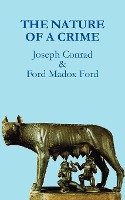The Nature of a Crime, the third of three collaborations between Joseph Conrad and Ford Madox Ford, was originally written when the two men were living in Winchelsea, Sussex, in 1906, but not published in book form until 1924, shortly after Conrad's death.The story takes the form of a series of love letters written by the unnamed narrator to a married woman, who is visiting Rome. In them, he states his intention to commit suicide as he anticipates being found out in a financial scandal.This new edition includes both writers' prefaces, and Ford's description of his first collaboration with Conrad (on the novel Romance) as an appendix. Edited by Robert Hampson, it also includes an informative Afterword and is fully annotated.

